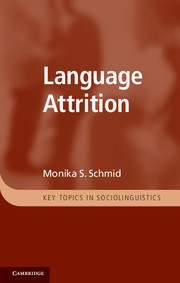Book contents
- Frontmatter
- Contents
- List of figures
- List of tables
- Preface
- Abbreviations
- 1 Introduction
- Part I Linguistic aspects of language attrition
- Part II Extralinguistic aspects of language attrition
- Part III Conducting research on language attrition – preliminary considerations
- 9 The test populations: participant characteristics and acquisition
- 10 Types of linguistic knowledge
- Part IV Experimental designs for attrition research – the language attrition test battery
- Part V Coding and analysing the data
- 18 Conclusion
- Glossary
- Notes
- References
- Index
10 - Types of linguistic knowledge
Published online by Cambridge University Press: 05 June 2012
- Frontmatter
- Contents
- List of figures
- List of tables
- Preface
- Abbreviations
- 1 Introduction
- Part I Linguistic aspects of language attrition
- Part II Extralinguistic aspects of language attrition
- Part III Conducting research on language attrition – preliminary considerations
- 9 The test populations: participant characteristics and acquisition
- 10 Types of linguistic knowledge
- Part IV Experimental designs for attrition research – the language attrition test battery
- Part V Coding and analysing the data
- 18 Conclusion
- Glossary
- Notes
- References
- Index
Summary
Attrition is a linguistic phenomenon, so in order to investigate it, we need to look at language. That seems fairly obvious, but language is not something we can go out and collect like butterflies or plant samples. As researchers, we need to take some kind of action in order to elicit the data that we want to look at. This chapter will discuss various ways of doing this, and also go into their respective advantages or disadvantages.
Chapter 9 acquainted you with the independent variables or predictors which play a role in the process of L1 attrition. These are the external factors which may impact on the processes of language attrition that we observe among bilingual migrants. In chapter 10, aspects of dependent variables will be discussed. These are those elements in an experiment which the researcher attempts to elicit, and which we expect will change or have changed as a result of differences in the predictors. Your dependent variables are therefore those linguistic features for which you expect to find differences between the experimental and the control population as a result of the process of attrition (their vocabulary or specific fields of it, their grammar, etc.). Again, you will make life a great deal easier for yourself if you try to be as specific as possible as to which linguistic features, and which aspects of these features, you are planning to investigate.
- Type
- Chapter
- Information
- Language Attrition , pp. 125 - 136Publisher: Cambridge University PressPrint publication year: 2011



